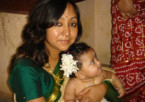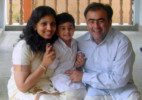
Pravin Ramachandran (Kerala) and Madhumita Kalauny Pravin (Uttarakhand)
Madhumita: “I didn’t need too much of an initiation to being married to a Malayali, really. I had many friends from Kerala in school, college and work, so other than a sharp increase in my seafood intake, being married to Pravin has not thrown up anything overtly Keralite.
“I do draw parallels with Onam from my own culture. As someone from the Kumaon region, every year we celebrate Harela, which is a harvest festival. Although the rituals are different (involving sowing five different seeds a few days prior and offering the harvested blades during pooja), the concept is similar to the spirit regeneration and renewal celebrated during Onam.
“My fondest memory of Onam was making an entire onasadya with no help for 40 workers and having my two kids aged seven and three help me serve each person. Watching them enjoy the food down to the nendrakkai varuval (fried and spiced banana chips) is definitely one of the better memories I’ve had from any festival. This year, the kids and I will be celebrating Onam in India. We plan to have an elaborate pookkalam (flower arrangement) and host a complete onasadya, which we will serve to underprivileged children on the day. Of course, new traditional clothes for my children will be a must.”
Pravin: “Mads’ (Madhumita) first onasadya as my wife was at my parents’ place in Sharjah — she dove straight in — making pookkalam with my cousins and cooking with my mother. She even tried her hand at tackling the complicated serving process. We did manage to confuse the daylights out of her by telling her how and what to eat first from the sadya; I don’t think she’s still got the hang of it. Despite that I’ve heard her on occasion trying to teach other non-Malayalis how to eat onasadya the right way — with the confidence of a ‘been there, done that’ fellow Keralite. I guess her only grouse would be the language barrier. As you’re aware, Malayalis tend to flock together, which means when we meet, we tend to chatter away, which to the untrained ear can sound like rapid machine gun fire.
“Mads and I have been married for 12 years now (she says ten, but it seems longer somehow). In that time, we’ve celebrated Onam in different ways — with our staff at our press in Ajman, the ‘million-plastic-cup’ takeaway sadya with obligatory banana leaf, we’ve cooked for friends (Mads is a good cook and makes a mean sadya) and we’ve also spent Onam away from each other. Our kids have not celebrated Onam the way I have when I was a kid; in fact, we’ve not celebrated Onam in Kerala together. But they probably know more about Holi than I did when I was young, so it balances out. After all, the more festivals, the more fun it is.”
Sunij Chacko (Kerala) and Anisha Batra Chacko (Chandigarh)
Anisha: “Marrying Sunij, it was truly North meets South — with our different languages, culture and cuisine. What’s also great is that we get to celebrate so many festivals together. My first Onam was five years ago; I still remember being excited like a two-year-old when it was time to wear the settu mundu (a traditional outfit for women) for the first time.
“The aroma of the food and having the whole family together definitely made the day even more special. For me Onam means getting the family together, having a great time and learning something new each year. My fondest Onam memory is from last year, when I got to celebrate it twice. I was pregnant and I craved Onam food; our uncle was sweet enough to prepare an absolute feast.
“Later that year we celebrated again on Onam day with our beautiful daughter, Arianna, and the family. Since last year Onam has been extra special for us as it gives Arianna a wonderful way to experience one of Kerala’s favourite festivals. This year the plans are to dress up, have amazing food and spend quality time with the family. I actually had plans to prepare the whole onasadya myself, but I’ve shelved these till next year; I feel I’m still not ready to prepare a feast just yet.”
Sunij: “I loved introducing Onam to Anisha. She loves our food and it’s also one of the best things I love about Onam, besides the family celebrating together. I remember her first Onam sari, my mother and her making a small pookkalam outside our apartment, my relatives explaining the traditions of Onam to her and the ladies from the family enacting an Onam dance to get us into the spirit of the festival.
“Except for Anisha getting her blouse stitched for the sari, we did not really prepare for Onam in advance. Although last year was extra special, as we got to celebrate with our baby girl. We’re fortunate to have family here in Abu Dhabi, which makes our Onam experience amazing each time. This year we plan to celebrate in keeping with most of the traditions we’ve followed since our first Onam together in 2007. Next year, we intend to go to Kerala to experience Onam in a grander and more festive way, which will be amazing, especially for Anisha and Arianna.”
Tinu Verghis (Kerala) and Quentin Staes (Belgium)
Tinu: “My Malayali-ness starts and ends with food! So, it was all about the food when it was Quentin’s time to experience Onam for the first time. With every passing year Quentin and I introduce more non-Keralites to Onam and food is the main lure.
“When it’s time for Onam, my modus operandi is simple. I look for Kerala associations in whichever country I’m in during Onam and dive into the meal straight away and then disappear without a trace after!
“I’ve joined the Lasalle College of Arts in Singapore this year, so we’ll celebrate Onam there. I’ve booked a Kerala restaurant that’s doing an Onam feast and will take all my classmates for lunch. And then I’ve booked a home delivery of the same feast for dinner to feed all our friends at home.”
Quentin: “It’s been interesting! Tinu is a walking stomach. As long as she can find some Malayali food, she leaves me in peace. She’s right when she says our Onam starts and ends with food. For my first Onam, she took me to the Orchid Hotel in Mumbai ten years ago. Of course, she was completely lost in the food. It was wonderful. I have to say my fondest memory of Onam is Tinu’s excitement when scraping a banana leaf absolutely clean. This year, I’m sure Tinu has found a Kerala Association for us. Onam will always mean Tinu and food to me. As for me, being Belgian I can say we celebrate no festivals as such. Nothing remotely similar to or reminiscent of Onam, for sure. We make the best malt beverages (450 varieties) and chocolates. We celebrate everyday of our lives with that.”
Tessy Koshy (Kerala) and Pawan Sehgal (Delhi)
Pawan: “Although my first visit to Kerala did hit me — I felt a little out of place — I’ve adjusted since, and it’s been a fine ride all through. Tessy and I have been very comfortable with each other from the start.
“My first Onam was like attending a typical Hindu Malayali wedding, where I remember eating with hands from a leaf for the first time. Speaking of the banana leaf, I do remember trying to hunt for it at various supermarkets at the last moment. Another memory is the first time I ever wore the mundu, which I managed to keep wrapped around me somehow!
“My fondest Onam memory is from two years ago — the first time I wore traditional Onam clothes and prepared the pookkalam. We invited an old widow who lived behind Tessy’s parents home — she arrived dressed up and was so happy as she felt like a part of the family. I like that Onam is celebrated by all Keralites regardless of caste or creed. The importance given to the food and decorations is quite similar to our festivals celebrated in the North. Onam, for me, is a family occasion — the hustle and bustle in the morning with the preparation and the chance to have friends and family over and catch up is great.”
Tessy: “Introducing Pawan to Onam was an interesting experience. In fact, it has made me follow more traditions associated with Onam; for instance, I never used to bother wearing the traditional Onam sari, but now we always ensure we dress up in Onam finery. My fondest memory has to be the first time I helped Pawan tie the mundu and watching him eat from the leaf. I’m happy that Pawan shares in my enthusiasm about Onam customs as well as the delicious feast, which he really does love. This year, we will celebrate with the family. Our son is now four years old and we’re excited about his reactions to eating from the banana leaf and helping decorate the pookkalam.” n








